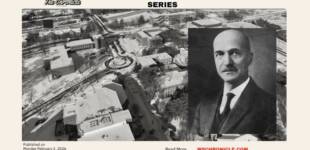City Council considers action on HB 2
Photo by Todd Luck
Attendees at Monday’s City Council meeting hold up signs showing their opposition to House Bill 2 and Gov. Pat McCrory, who signed it into law.
Local LGBT community asks the council to oppose what they say is a discriminatory law
BY TODD LUCK
THE CHRONICLE
A resolution voicing concerns about HB2, which prohibits local ordinances protecting lesbian, gay, bisexual and transgender (LGBT) individuals, made for a packed, passionate City Council meeting on Monday, March 28.
It was standing room only as many came to speak out about HB2. City Council Member Dan Besse proposed adding a resolution to the council’s legislative agenda calling for a legislative review of HB2 and asking Forsyth lawmakers to undo its “damaging legislative changes.” Among its many provisions, HB2 restricts local governments from going further than state law in discrimination protections and minimum wage, and says individuals can only use public restrooms that match the gender on their birth certificate, though private businesses and institutions can still create their own discrimination and restroom policies.
During the public comment session, Liam Hooper, a local minister who also leads a transgender support group, said he can’t follow the gender on his birth certificate .
“Because of this law, because my birth certificate doesn’t match my gender, because I was born in Indiana, I am now required to go in the women’s room,” he said. “I want you to digest that visual image for just a minute: facial hair and all and a receding hairline. There’s no way I can walk in there and anyone’s going to think I belong there, which means I’ll be arrested, and it is my firm belief, after spending an entire day in Raleigh listening to the nonsense that our elected officials are speaking, that is exactly their intention.”
Char Van Schenck, a Wake Forest student, said if HB2 was repealed, it would be a return to normal, since transgender individuals already use restrooms they’re comfortable with, and urged the council to take action against the law.
“You would send a message to the trans people of Winston-Salem, whether they’re here for weeks, for college or for the rest of their life, that we are welcome just like everyone else,” said Van Schenk.
Dani Bennitez, who is gender queer and doesn’t identify as male or female, cried, recalling childhood struggles with gender identity.
“I don’t understand why I can’t be a man or a woman, that’s how my brain works, that’s how my body works,” said Bennitez. “I don’t know how to explain it to you because you’re not in my body.”
Jack Fisher of Pfafftown was one of two people to speak against the resolution and said he didn’t feel like HB2 was discriminatory.
“Let’s use our heads on this thing and not let it get so blown out of proportion that we’re comparing it to things that we don’t want to,” he said.
Rev. Laura Spangler of Lloyd Presbyterian Church also spoke in opposition of the resolution, saying she hopes the City Council considers a “higher power” in their decision. “I do hope and pray that you work for the good and for the protection of women and children,” she said.
HB2 was a reaction, largely among Republican lawmakers, against a non-discrimination ordinance passed in Charlotte that would’ve provided LGBT protections, including giving transgender individuals the right to use the restroom of the gender they identify as. Opponents of the Charlotte ordinance have raised concerns that it may put women or children in danger of sexual assault. Proponents of the ordinance have rejected that as a scare tactic and stereotype and point to the more than 200 cities around the country, including three in South Carolina, that have similar ordinances.
A local rally against HB2 at City Hall drew more than 150 attendees on Friday. The ACLU and Equality NC have filed a suit against the law and Attorney General Roy Cooper, who is running for governor, has refused to defend HB2. Many companies have voiced opposition to it and the State of New York and the cities of Seattle, West Palm Beach and San Francisco have already banned non-essential travel of their employees to North Carolina.
“We’re already seeing a widespread and troubling national adverse effect from businesses as diverse as the NBA, WellsFargo, and today we learned prospective attendees of the High Point International Furniture Market,” said Besse after he read his resolution.
Most members of the City Council took the opportunity to voice opposition to the General Assembly’s actions, including Derwin Montgomery who said every protective class should be concerned about HB2.
“I think that if we have legislators in Raleigh who want to meddle in municipal governments, they ought to resign from Raleigh and come and run for city council and board of alderman and county commissioner and not attempt to run city government from Raleigh,” said Montgomery.
Mayor Pro Tempore Vivian Burke railed against the General Assembly, saying she wasn’t afraid of retaliation from the legislature, a concern several council members mentioned.
“They act as if they thought we work for them, they should work for us,” she said.
Recently N.C. Rep. Donny Lambeth, R-Forsyth, said he felt the resolution would make it harder for the county’s lawmakers to do things like preserving sales tax revenues for cities.
City Council Member Robert Clark said he had questions on each point in the resolution and that he’d seen it for the first time 45 minutes ago. Besse said he’d emailed it to every City Council member on Friday. Ultimately, several other council members had questions about the resolution, including James Taylor who recommended it go to the General Government Committee, a move that was approved by the City Council with Montgomery and Molly Leight voting in opposition because they wanted to approve the resolution immediately.
Mayor Allen Joines invited the many attendees to come to the committee meeting on April 12 at 4:30 p.m. and come back when it comes before the full council again on April 18 at 7 p.m.









